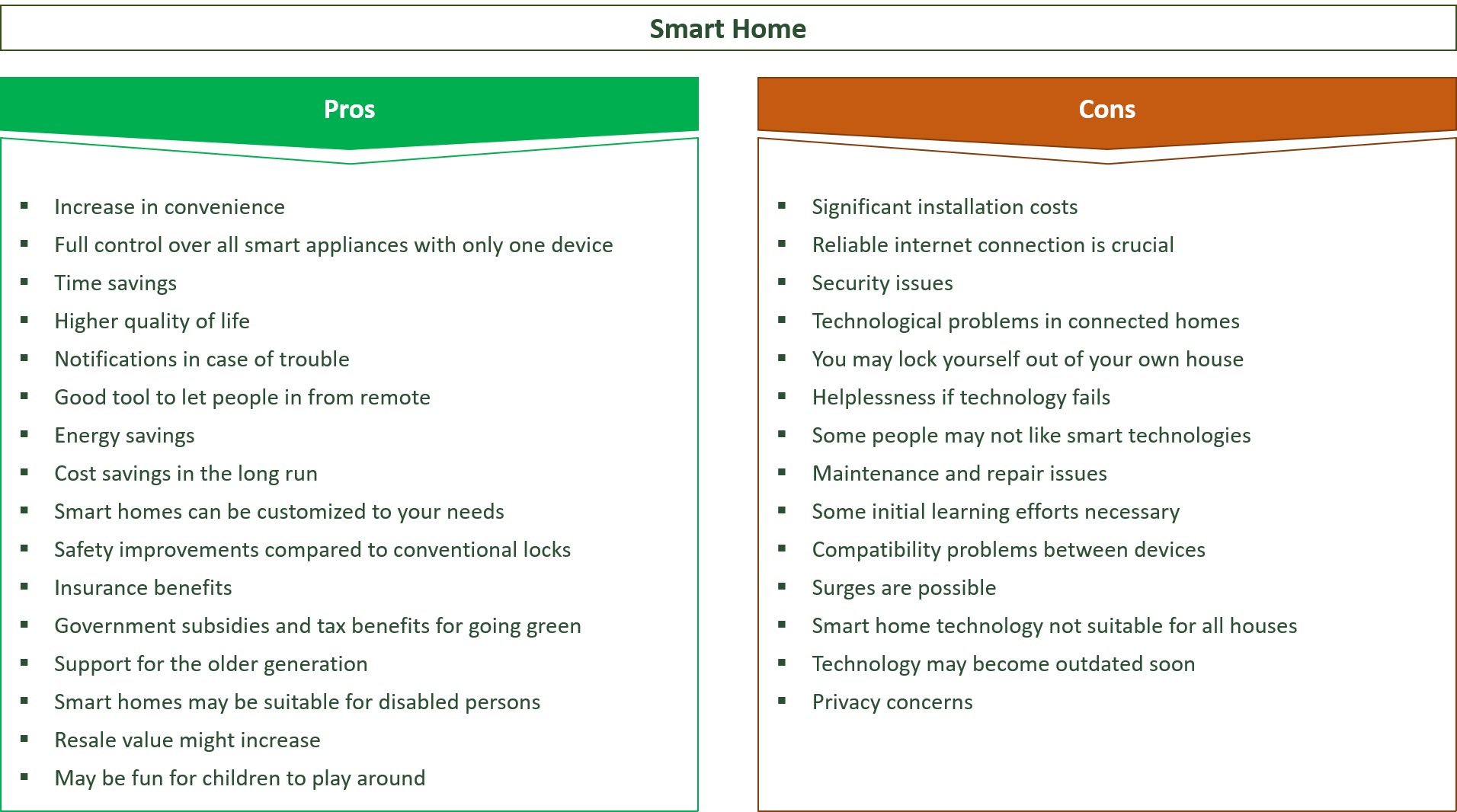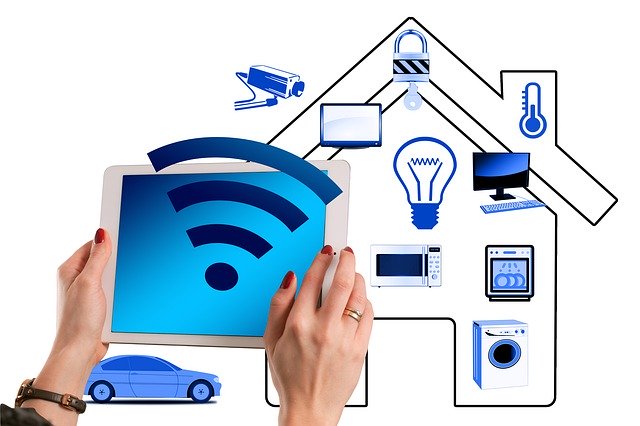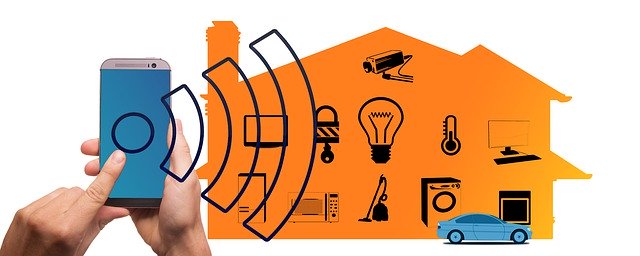” People assume that the smarter your home, the better your life, but in reality, technology so often gets in the way of leading a good life.”
Joe Gebbia, Designer
Advantages & Disadvantages of Smart Homes

Smart homes can be defined as properties where devices and appliances can be controlled remotely by smartphone or other devices connected to the internet.
For instance, this can include turning on your air conditioning or your heating while you are still in your car on your way back home.
Smart home technologies can be quite convenient, yet there are also some problems associated with them.
In this article, the pros and cons of smart homes are examined.
Audio Lesson
Contents
Advantages of Smart Homes
- Increase in convenience
- Full control over all smart appliances with only one device
- Time savings
- Higher quality of life
- Notifications in case of trouble
- Good tool to let people in from remote
- Energy savings
- Cost savings in the long run
- Smart homes can be customized to your needs
- Safety improvements compared to conventional locks
- Insurance benefits
- Government subsidies and tax benefits for going green
- Support for the older generation
- Smart homes may be suitable for disabled persons
- Resale value might increase
- May be fun for children to play around
Increase in convenience
One upside of smart homes is that they can significantly increase the level of convenience in a house.
For instance, you can regulate the air temperature while lying on your couch.
After that, you can adjust the lighting in every way you want without having to get up.
There are many other things that you can do if your home is connected which can save you plenty of energy.
For instance, imagine you come home from a long day from work and are quite tired.
Chances are that you might want to spend as little effort as possible.
Therefore, smart home technology is a great tool to make your life easier and to save you energy for several tasks of your daily life.
Full control over all smart appliances with only one device
The crazy thing about smart homes is that they can often be controlled by just one single device.
This means that as long as you have a smartphone and a working internet connection, you can control most devices at your home from one central point.
This gives you full control over your home and you can even adjust several settings in other rooms of your house.
For instance, if you do not want to get upstairs to change the settings of a device, you can do it right from where you stand due to the sophisticated interconnection of household appliances.
Time savings
Since many appliances at your home can be controlled with only one device, you might be able to save plenty of time in the long run.
For example, imagine you use public transport every day to commute to work and back.
Instead of just waiting until the bus or the train brings you back home, you could change some settings at your home so that you do not have to do it once you are actually back home.
By doing so, you can use your commuting time more efficiently and can spend the saved time on other things you enjoy more.
Higher quality of life
Since smart homes allow you to adjust everything from just one single device, chances are that also your overall quality of life will increase.
You might have a good feeling since you know you can change all settings and you have full control over all your appliances.
This may give many people a feeling of security and therefore an increase in the overall quality of life.
Notifications in case of trouble
Smart homes also allow you to get notified in case there are any issues with your home.
For instance, if someone tries to burgle your house, you might get a notification on your smartphone that an unauthorized person is on your property.
This may help to catch the thief since the police can be informed in real-time.
Moreover, you might also get notifications in case your fridge is empty and you need to buy some food.
In a few years, it will likely even be possible that your fridge will order this food fully automated.
This may sound crazy at first, however, this may greatly help you getting your daily tasks done since you will have more time for other things.
Good tool to let people in from remote
Sometimes, there is also the need to let people into your house for repairs or for other maintenance work.
However, many people are at work during the day and have no one who could open the door for those workers.
With smart homes, it will be possible to open the door from remote and therefore, you could conveniently open your door once the workers arrived from your workplace.
Thus, smart homes can also make our lives easier in case someone has to enter your home for some reason and you are not at home during this time.
Energy savings
Smart homes can also help you to save plenty of energy.
For instance, when you heat your home in winter with conventional heating devices, chances are that you will either heat too little or too much since it is quite hard to sustain an optimal temperature inside with those old devices.
However, by using smart home technologies, chances are that your heating will keep the temperature inside at a constant level.
Therefore, smart energy devices can avoid excessive heating and help you use the heat as efficiently as possible.
This is not only true for heating, but also for air conditioning and other devices that could consume large amounts of energy.
Cost savings in the long run
Since you can save large amounts of energy through the use of smart home technologies, you can also save plenty of money in the long run.
Energy prices will likely increase in the future due to the energy transition process towards alternative energies and therefore, it might be crucial to save some energy since those energy savings may translate into significant money savings.
Smart homes can be customized to your needs
Smart homes are also not a static construct.
Depending on your preferences, your smart home can be customized and certain devices can be either included or left out.
For instance, if it is not important for you to control your roller blinds from your smartphone, those do not have to be connected to your smart home technology.
Therefore, you can connect almost every device you want while you do not have to if you don’t want to do so.
Safety improvements compared to conventional locks
Depending on the technology you are using for your smart home, it can also provide you with significant safety improvements compared to using a conventional lock for your door.
Some smart homes come with cameras and other things that will make it quite hard for burglars to get into your home.
Thus, also from a safety perspective, safe homes can be an upgrade to conventional homes.
Insurance benefits
Some insurances also consider safe homes to be less vulnerable to burglary and therefore offer discounts on the insurance premium.
This means that you can save significant amounts of money over time simply due to fact that you own a smart home instead of a conventional house.
Thus, depending on the insurance company, smart homes can not only save you money from lower energy consumption, they can also save you money from lower insurance premiums.
Government subsidies and tax benefits for going green
If you set up your smart home in a way that it will be eco-friendly, chances are that you may be eligible for government subsidies or tax advantages since in many countries, green technologies are subsidized in order to speed up the energy transition process.
Therefore, you should check out if there are any grants or subsidies available in the region you live in order to save even more money with your smart home.
Support for the older generation
Smart homes can also be a great way to facilitate the life of our older generation.
For instance, with smart homes, you can simply open the door with your voice without even needing a key to get in.
Thus, since old people often don’t find their keys anymore, it may be a great help to open the door with their voice instead of having to search for the key.
Moreover, old people often also have difficulties to walk upstairs due to their weak physical condition.
Thus, smart homes may also be quite helpful to control certain devices upstairs so that old people do not actually have to go up there.
Smart homes may be suitable for disabled persons
Also for disabled persons, smart homes may be a great tool to facilitate their lives.
For instance, if you sit in a wheelchair, you will not be able to use staircases.
Thus, if you want to control devices in other rooms, you may be stuck in a conventional home since you will not be able to reach those devices.
However, with smart homes, you can control those devices with your smartphone and your level of flexibility might increase due to that.
Resale value might increase
Another advantage of connected homes is that they might have a higher resale value.
People in our nowadays society are often quite convenient and demanding and an increasing number of people value the benefits of smart homes.
Thus, due to this increasing demand for smart houses, also the prices tend to increase.
Therefore, if you plan to sell your home at one point in time, it might be a good idea to invest in a smart home due to the higher resale value compared to conventional homes.
May be fun for children to play around
Apart from the many practical benefits of smart homes, it may also just be fun to live in a smart home for children.
They may play around with all kinds of things from their smartphones and may have a great time.
Thus, smart homes may also be a great tool to keep your children busy and playful.

Disadvantages of Smart Home Technology
- Significant installation costs
- Reliable internet connection is crucial
- Security issues
- Technological problems in connected homes
- You may lock yourself out of your own house
- Helplessness if technology fails
- Some people may not like smart technologies
- Maintenance and repair issues
- Some initial learning efforts necessary
- Compatibility problems between devices
- Surges are possible
- Smart home technology not suitable for all houses
- Technology may become outdated soon
- Privacy concerns
Significant installation costs
As we can see from the previous analysis, smart homes can be a great way to facilitate our daily life.
However, there are also some problems related to smart homes.
One disadvantage of smart homes is that they can be quite costly.
There might be significant installation costs which may amount to many thousands of dollars.
Depending on the quality of the system, there might be even no limit and many people might not be willing to spend this kind of money on their smart home.
However, smart homes can also save you money in the long run due to energy savings.
Thus, if you consider engaging in smart home devices, you should also take into account the long-term benefits, not only the high initial costs of this technology.
Reliable internet connection is crucial
Another downside of smart homes is that they need a reliable internet connection to work properly.
For instance, if you live in an area where the internet connection is rather poor, you might experience serious issues since your smart home devices might not respond the way you want them to.
Moreover, if you want to control your smart home device from your work or from other remote places, you might not be able to do so since you might not be able to connect with your devices in a sufficient manner.
Security issues
There might also be some security issues associated with smart home technologies.
For example, burglars could hack into your smart home system and open the lock in order to get access to your home.
Moreover, hackers may also steal your data.
Thus, even though smart homes are quite convenient, there are significant security issues related to them and you should be aware of those issues if you plan to invest in smart home devices.
Technological problems in connected homes
Another issue with smart homes is that they are rather complex technological systems and therefore quite vulnerable to technical problems.
For instance, if there are connection problems from your smartphone to your household devices, chances are that you will no longer be able to control your smart home device anymore.
Even though technology progresses and becomes better over time, technological issues might still be a problem and nothing works 100% of the time.
You may lock yourself out of your own house
If your smart home system has been set up in a quite poor and incompetent manner, you might even lock yourself out of your own home.
For instance, if the voice system will not be able to recognize your voice anymore, you may not be granted to access your house and you might have to call an expert to open your door instead, which can be quite costly, especially on weekends or at late hours.
Helplessness if technology fails
Our technological progress can be considered to be a good thing since it can improve the quality of life of everyone of us.
However, there are also some problems related to technology.
For instance, you might be quite helpless if your smart home technology fails.
Since you always relied on this technology to work and adapted your behavior, you might feel lost in case your smart home technology will not work anymore.
Thus, excessive reliance on those technologies might not be a good thing and you should always stay independent enough to handle your life, even if your smart home devices fail.
Some people may not like smart technologies
Many people also just don’t like the idea of a smart home.
Especially the older generation is often quite skeptic about it.
Since we often hear about weaknesses of those systems which make it easy for burglars to get into our home, many people may refrain from those smart home technologies and rather rely on their old-school locks, even if those locks are also quite unsafe.
Maintenance and repair issues
Smart homes may also imply some problems when it comes to maintenance or repairs.
Especially if you live in remote rural areas, you might have a quite hard time to find someone who has the expertise to fix issues with smart homes.
Many handymen are not skilled enough in this field yet and finding an export to fix those smart home technologies might not be easy.
In the worst case, you might have to fix those issues by yourself, which would imply that you have to spend long hours learning all the technological stuff yourself.
Some initial learning efforts necessary
Even if the smart home system works properly, there is still some learning required from your side in order to manage your home from just one single device. In the first days, you might feel a little bit overwhelmed.
However, you will quickly get used to the new functions that are available to you and over time, controlling your household devices with your smartphone will be no big deal anymore.
Compatibility problems between devices
Even though the idea behind smart homes is to have one single program that allows us to connect to all of our smart devices, there are some compatibility issues in real life.
For instance, some household devices may require app A while others may require app B.
Thus, you might need to use a variety of apps to control all of your devices, which may be rather inconvenient and exhausting in the long run.
Surges are possible
Due to the interconnectedness of those household devices, also the probability of surges increases.
If your home is not protected properly, this may increase the chance for fires and in the worst case, your house may burn down due to the use of too many smart household devices at the same time.
Smart home technology not suitable for all houses
Depending on how old your house is, it may not even be suitable for smart home technologies since those technologies often require a certain wiring and many old buildings do not have proper wiring in this regard.
Thus, before you decide to install smart home devices, make sure that your home is actually suitable for it.
Technology may become outdated soon
Another disadvantage of smart homes is that the technology that is used may become outdated soon.
Our technological progress is astounding and things that seemed to be impossible may become possible in just a few years due to artificial intelligence and machine learning.
Therefore, if you install a smart home right now, chances are that you will not be up to date a few years from now and that you may have to make plenty of adjustments over time.
Privacy concerns
Critics of smart homes also often claim that there might also be significant privacy issues related to the use of smart home technologies.
For instance, if you use a smart voice recognition system, your data may be gathered by those companies and you may not know what happens with this data and for what purposes it may be used.
Therefore, there are also some privacy concerns related to smart homes and you should evaluate yourself if you want to risk giving away your data to third parties.

Top 10 Smart Home Pros & Cons – Summary List
| Smart Home Pros | Smart Home Cons |
|---|---|
| Higher level of convenience | High upfront costs |
| Time savings | Maintenance may be an issue |
| Full control over devices | Privacy concerns |
| Energy savings | Security issues |
| Monetary savings | Internet connection is crucial |
| Higher home resale value | Technology may become outdated soon |
| Remote access to a home | Problems if technology fails |
| Improvements in the quality of life | You might lock yourself out of your house |
| Can be customized to your preferences | Not suitable for all homes |
| Smart homes may be fun | Chances for surges may increase |
Should You Invest in a Smart Home?
As we have seen before, there are many important advantages to smart home technologies.
However, there are also some problems related to smart homes.
In the end, you should carefully evaluate all the pros and cons in order to make a profound decision of whether you want to invest in a smart home or not.
Sources
https://en.wikipedia.org/wiki/Smart_home_technology
https://www.investopedia.com/terms/s/smart-home.asp

About the author
My name is Andreas and my mission is to educate people of all ages about our environmental problems and how everyone can make a contribution to mitigate these issues.
As I went to university and got my Master’s degree in Economics, I did plenty of research in the field of Development Economics.
After finishing university, I traveled around the world. From this time on, I wanted to make a contribution to ensure a livable future for the next generations in every part of our beautiful planet.
Wanna make a contribution to save our environment? Share it!
